Columns
- Billionaire businessman withdraws because of his firm belief in Feng Shui and indisposition of family member
- More shocks to Pohottuwa as Pavithra and Rohitha decide to support Ranil
- Several parties and civil organisations sign agreement with SJB to support Sajith’s candidacy
By Our Political Editor
The latest, one is reminded, took place just days ago in Bangladesh. Prime Minister Sheikh Hasina Wazed, the daughter of the founder leader of that nation, once East Pakistan, Banga Bandhu Sheikh Mujibur Rahman, resigned amidst mounting protests. She fled to India from that predominantly Bengali nation. Having her plea for asylum turned down by the United States and Britain, she now awaits a response from a leading West Asian country.
At the External Affairs Ministry in the South Bloc in New Delhi, a top official, who had once held a high position in India’s High Commission in Colombo, quipped to a visiting Sri Lankan that “Sri Lanka has taught nations in the region how to evict governments the people disliked.” Coming from a friend who was fond of Sri Lanka, the man who heard it was speechless for a moment. The official was alluding to the public protests or aragalaya that drove President Gotabaya Rajapaksa out of office and out of the country. In general terms, there were only two main issues that were different in the fierce political turmoil that gripped the two countries.
The Sri Lankan President failed to obtain asylum from any Western country for they had raised serious issues against him over alleged human rights violations. True or false, they have even been documented and placed before the UN Human Rights Council (UNHRC) in Geneva. A new chapter is set to unfold there in September this year. Efforts to reach out to at least two West Asian countries thereafter failed. Gotabaya Rajapaksa’s rule was considered anti-Muslim since members of that faith were cremated, much against their religious belief and unheard of in the Muslim world, during the outbreak of the Covid pandemic. Ali Sabry, his personal lawyer, the man whom he chose as Foreign Minister, spearheaded a drive to apologise for the action just weeks ago. However, the former President’s book “CONSPIRACY to oust me as President,” laid the blame on Muslims for his woes and exit. The apology, coming as it does ahead of the September 21 presidential election, did little to console those who had lost their near and dear ones. The agony was more for they could not identify the graves in a little-known village in the east. They were not marked. If the apology turned out to be an admission of fault, Sri Lanka was the only country in the world to do so.
Even Minister Sabry refrained from public remarks then despite protests both locally and internationally.
It can now be revealed that a high-ranking Indian government official tried to persuade then-President Gotabaya Rajapaksa not to leave Sri Lanka. The news leaked from the highest levels. In the event he required the enhancement of his personal security, those in New Delhi were ready to provide it, he had been told. This was on the grounds that he was a leader who had been democratically elected and his ouster through violence would not have augured well for New Delhi’s southern neighbour. It was India that he visited first after being elected president. According to other sources, the same official had telephoned him again hours after his arrival in Singapore to re-state the same case. He also talked on follow-up action he proposed to take.
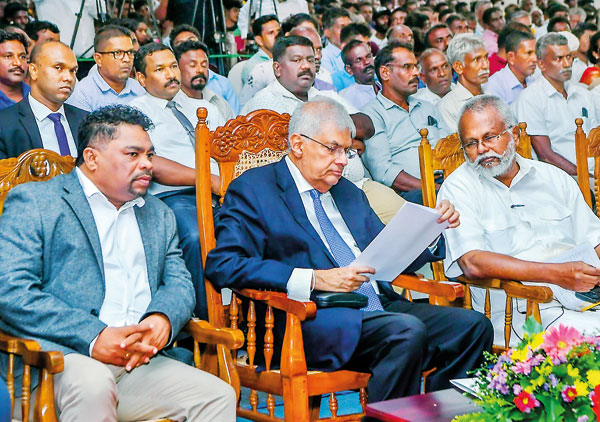
President Ranil Wickremesinghe at the Fishermen's Convention
When mammoth civilian protests led to mobs taking over the Presidential Secretariat and the Janadipathi Mandiriya (President’s House) in July 2022, they caused only ‘political tremors.’ Gotabaya Rajapaksa had already named Ranil Wickremesinghe as Prime Minister. Hardly had he sent in his resignation as President from Singapore, Parliament elected Wickremesinghe as successor to complete the remaining term. If what followed, the economic crisis, could be likened to a ‘political earthquake,’ the reverberations came to be felt in many sectors. When Gotabaya Rajapaksa ended his permitted tenure in Singapore, he obtained a two-month-long visa to spend time in Bangkok. He did not like being confined to a hotel under tight security and was forced to return to Colombo. For once, there were two presidents in Sri Lanka who held large personal security contingents, over 110 personnel. There was no remorse, and no regret, leave alone an apology for the Muslim burials, nor for an official request to neighbouring Maldives to bury Sri Lankans who died of Covid. The Maldives said a firm “no.” “We don’t want our nation to become a burial ground for another country,” remarked former President Maumoon Abdul Gayoom to a former cabinet minister and strong loyalist. A main contributory cause for the agitation against the man who won 6.9 million votes at the 2019 presidential election was over the import ban on chemical fertiliser. Paddy cultivation dropped drastically. Shortages of food and consumer items followed.
In Bangladesh, however, a so-called “Brown revolution” was because Premier Hasina’s government had re-introduced a quota for civil service jobs. A third of them were reserved for relatives of veterans from Bangladesh’s war for independence from Pakistan in 1971. Some local politicians, however, claimed (erroneously of course) that Hasina would have been still Prime Minister if she had released rival Khaleda Zia (78), a former Premier herself. She was under house arrest. An entrepreneur, banker, economist and civil society leader, Mohamed Yunus, has been sworn in as the leader as military and police strive to restore law and order. He is a 2006 Nobel laureate.
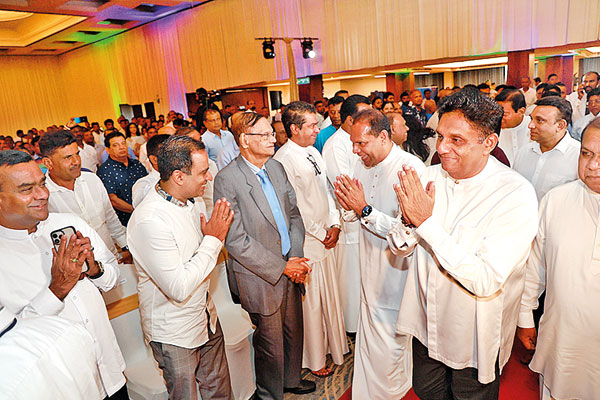
SJB leader Sajith Premadasa greets members of groups that joined in alliance.
One area that has not been hit by this ‘political earthquake’ was the ruling party, the Sri Lanka Podujana Peramuna (SLPP). Ranil Wickremesinghe, who for all intents and purposes was the leader of the United National Party (UNP), was at the helm. To his credit, he has managed to arrest rising public discontent. His deal with the International Monetary Fund (IMF), though it heaped some hardships on the people, prevented economic catastrophe and a spillover of violence. The Cabinet of Ministers, barring one of them, had remained in office when Gotabaya Rajapaksa was president too. The only exception is Ramesh Pathirana, who was assigned the health portfolio by President Wickremesinghe after then incumbent Keheliya Rambukwella was arrested by the Criminal Investigation Department (CID) for alleged malpractices in drug imports. He held the plantation industries portfolio until then, Rambukwella is now in remand custody.
As reported in these columns periodically, when the presidential election drew nearer, Wickremesinghe forged a new arrangement with the SLPP leadership to form a Strategic Affairs Committee. Among those on his side were Presidential Chief of Staff Sagala Ratnayake and Presidential Secretary Saman Ekanayake. Representing the SLPP were its founder Basil Rajapaksa and Minister Prasanna Ranatunga. There were joint media committees among others. Political issues they were facing were discussed cordially over dinner at the new presidential residence at Mahagamsekera Mawatha (former Paget Road). This saw the emergence of two lines of thinking, one from the President and those backing him. The other was from the SLPP. It had not always been a smooth ride. Issues surfaced. An example is the divestiture of state property. The issue raised concerns with SLPP leader Mahinda Rajapaksa himself. Yet, they co-existed until the issues aggravated.
As revealed last week, a dialogue ceased to exist after the SLPP politburo decided to field its own candidate and not back Wickremesinghe at the September 21 presidential election. A sizeable number of ministers, deputies, state ministers and parliamentarians have chosen to back Wickremesinghe. The Presidential Media Division claims that the number is 92 though the SLPP has challenged this figure. It says it is less than 67. One of the SLPP senior members said that the exact figures were now being computed. Here are some of the latest developments, which no doubt, have dealt a hard blow to the SLPP. The party is out in many ways but not down by any means.
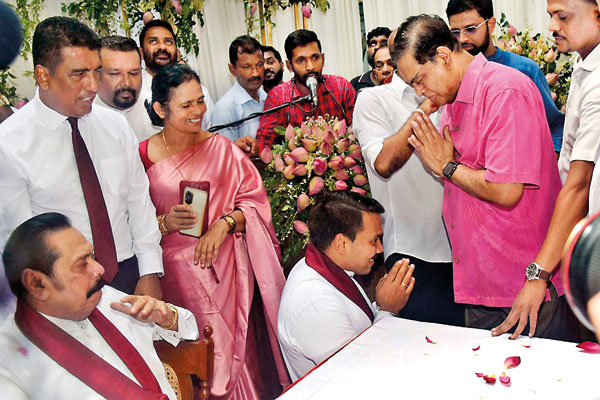
It was first a hug and a kiss to father, Mahinda Rajapaksa, leader of the SLPP. Then Namal Rajapaksa fell at the feet of Basil Rajapaksa, the party founder. These were scenes after he was declared the SLPP candidate.
Dhammika withdraws
It is exactly 38 days before that Dhammika Perera, a leading multimillionaire businessman, declared in an SMS message that he was ready to contest the presidential election if his party (the SLPP) decided to field him. It was revealed in these columns. The declaration came after he together with SLPP National Organiser, Namal Rajapaksa MP, declared open an SLPP office at Rosmead Place. It came amidst speculation that Perera would be the party’s presidential candidate. However, last Tuesday, Perera wrote to SLPP General Secretary Sagara Kariyawasam, informing him that he was not willing to be a presidential candidate for “personal reasons.”
The Sunday Times learns that the reason was twofold. He is known to be a firm believer in Feng Shui which some regard as a superstitious practice. The website Britannica says “Feng Shui gained new prominence in the West after US President Richard Nixon’s visit to China in 1972. In the 1980s, Feng Shui master Thomas Lin Yun Rinpoche founded the influential Black Hat Sect Tantric Buddhist (BTB) style of Feng Shui in Berkeley, California. This form of Feng Shui became widely popular in the West. The BTB method uses a bagua chart that shows correspondences between cardinal directions and aspects of life, including wealth and prosperity, fame and recognition, love and relationships, family, health, creativity and children, knowledge and self-cultivation, career, and travel and helpful people.” Perera is a firm believer in time and other formalities. It also explains why he always sports only a maroon tie. Bad news for him last week was the sudden illness of a close family member who had to be hospitalised.
Perera was also privy to a major political campaign that was being planned against him. The target was his business empire, particularly his casino operation. By withdrawing from the candidature, he has said, he wanted to save possible embarrassment and inconvenience that would be caused to hundreds of his employees. On the other hand, “research” work done by rival groups had unearthed details that could mar not only his campaign but cause damage to the SLPP’s image.
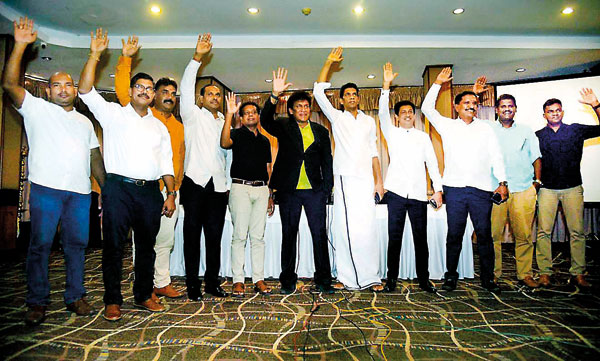
Some of the political parties representing the plantation sector who tied up in an alliance with the Samagi Jana Balavegaya (SJB)
No sooner than his letter of withdrawal was received, the SLPP leadership went into action. Namal Rajapaksa, who was on a visit to Mihintale was asked to return to Colombo immediately. He had to cancel some of his engagements. “Except to say we will name our own party candidate for the presidential election, we did not announce any names,” Basil Rajapaksa, founder of the SLPP told the Sunday Times. “We considered several names thereafter. That included Prime Minister Dinesh Gunawardena, former senior minister Gamini Lokuge and our General Secretary Sagara Kariyawasam. We decided on Namal Rajapaksa, for whom there were several requests from our branch organisations. Namal agreed,” he said.
Moreover, he pointed out that, we had other eligible candidates too. In the alternative, he said, “We could have even supported Wijeyadasa Rajapakshe for example. Though he is contesting under another party, he remains a member of the SLPP in Parliament. He has even paid his membership subscription. There are others like that too. Similarly, even Sajith Premadasa can claim that he has the support of the Sri Lanka Freedom Party (SLFP) since onetime leader, Maithripala Sirisena is backing him. There were also other members who continue to pay their membership fee and are technically representing the SLPP in Parliament. They include Prof. G.L. Peiris, Dullas Allahapperuma and even Nimal Lanza.
Explaining the late decision over Namal Rajapaksa, another senior member said “the pohottuwa considers SJB’s Sajith Premadasa and NPP’s Anura Kumara Dissanayake as formidable candidates. Our aim is to build support and make sure there is a two cornered fight,” he said. That is between their candidate and the others.
There were two major shocks for the SLPP. This was when two SLPP stalwarts declared they would support the candidature of Ranil Wickremesinghe. One is the All Island National Convenor Rohitha Abeygunawardena. Just this week, he was at the head of a parade riding a motorcycle without number plates. This is how he went to Wariyamankanda in the Bandaragama electorate. There, from the Nirmala Hotel, he made an announcement. He said that during an earlier presidential election, his mother had told him not to come home without supporting Mahinda Rajapaksa. Similarly, this time, his mother had asked him not to return home if he did not support President Wickremesinghe. For once, it is not the electors but a politician’s mother who is advising on key decisions. Parliamentarian Abeygunawardena sat at the presiding area of the SLPP politburo meeting with other leaders when it decided to field its own presidential candidate.
The other is Pavithradevi Wanniarachchi. She declared on Thursday that she had decided to support President Wickremesinghe. This was after wide-ranging discussions she had with people in the Ratnapura district which is her electorate. She remained the Treasurer of the SLPP and was also in the presiding area at the same politburo meeting. It seemed a strange coincidence that SLPP leader Mahinda Rajapaksa was discussing developments in the party with founder and brother, Basil Rajapaksa, on Friday. This was when news reached that a three-judge bench of the Supreme Court had upheld a decision by the Samagi Jana Balavegaya (SJB) to expel Harin Fernando (National List) and Manusha Nanayakkara (Galle district). The bench comprised Justice Arjuna Obeysekera, Justuce Vijith R. Malalgoda and Justice Achala Wengappuli. They have ceased to become members of Parliament. Both resigned from their positions as Cabinet ministers.
District level participants at the discussion urged that the SLPP also decide to expel those who violated the party decision and expressed support for Wickremesinghe. They argued that there would be backing from the courts if such a decision was taken. Mahinda Rajapaksa, followed by brother Basil, declared that it was not the moment to take any such action. Party leader Rajapaksa said, ‘Let us focus on the election for the time being. I am sure most will realize their mistake and return.’ Added Basil, “We have known for some time the identities of those who were working against the interests of the party. There are two more, but I will not name them. We knew what they were planning to do. By showing themselves up, they have done the party and their members a great favour.” He added that the SLPP must represent “the people of this country and ensure national assets are protected.”
SJB-led alliance
Another development on Thursday was some political groups teaming up with the Samagi Jana Balavegaya (SJB) in an alliance. They were extending support for SJB leader Sajith Premadasa. These groups style themselves the Samagi Jana Sandanaya. There were also several other civil organisations present at the signing ceremonies at the Sugathadasa Indoor Stadium.
Among those who signed the agreement with the SJB were Rauf Hakeem (Sri Lanka Muslim Congress), Mano Ganesan (Democratic People’s Front), Palani Digambaram, V.S. Radhakrishnan, G.L. Peiris (Freedom People Congress), Dullas Alahapperuma (Freedom People’s Congress), Dayasiri Jayasekara (SLFP Faction), Arjuana Ranatunga (Purawesi Handa), Ramasami Rajendran, E.L.B. Sabeel (Yaha Palanaya Sandaha Jathika Peramuna), Wijaya Sundaram Ramesh (Pragathiseeli Demala Jathika Peramuna), General Mahesh Senanayake (Pibidena Ranviru Sanvidanaya) and Devika Kodithuwakku (Government Midwives Association). SJB General Secretary Ranjith Maddumabandara signed the agreement on behalf of the party.
Maddumabandara, in his welcome address, said that strong and powerful parties have joined them to create the broadest and most powerful alliance “Samagi Jana Sandanaya” to further strengthen their party.
In another development, a former Member of Parliament from Batticaloa district Pakkiyaselvam Ariyanenththiran has been nominated as the so-called “Common Tamil Candidate” by some Tamil political groups. Ariyanenththiran is a Central Committee Member of the Illankai Thamil Arasu Katchi (ITAK) which until recently was the leading party within the Tamil National Alliance (TNA).
The premier Tamil Party of the north and east, ITAK, has kept away from the decision. As reported in these columns, at a recent Central Committee meeting, out of the 33 persons who attended the meeting, only three spoke in favour of this idea of a Tamil Common Candidate. The next Central Committee meeting is scheduled for today, Sunday, in Vavuniya. A source said the party is likely to reject the idea of this Common Candidate.
Twenty-seven candidates have placed their deposits to contest the September 21 presidential election till Friday evening. They are: 01. Ranil Wickremesinghe – Independent, 02. Sarath Keerthirathne – Independent, 03. Oshala Anil Herath – New Independent Front, 04. A.S.P. Liyanage – Sri Lanka Labour Party, 05. Sajith Premadasa – Samagi Jana Balawegaya, 06. P.W.S.K. Bandaranayake – National Development Front 07. Wijeyadasa Rajapakshe – National Democratic Front
08. K.K. Piyadasa – Independent, 09. Siritunga Jayasuriya – United Socialist Party
10. Ajantha de Zoysa – Ruhunu Janatha Party, 11. K. Ananda Kularathne – Independent, 12. Sarath Manamendra – Nawa Sihala Urumaya Party
13. Ven Battaramulle Seelarathana Thera – Janasetha Peramuna 14. Ven Akmeemana Dayarathana Thera – Independent, 15. Siripala Amarasinghe – Independent 16. K.R. Krishan – Arunalu Janatha Peramuna 17. Gardihewa Sarath Chandralal,mfonseka- Independent, 18. Dissanayake Mudiyanselage Anura Kumara Dissanayake – National People’s Power, 19. Pani Wijesisiwardena – Samajawadi Samanatha Pakshaya, 20. Biyanwilage Anthony Victor – Independent, 21. Ahidurus Muhammed Illyas – Independent, 22. Marakkala Manage Pemasiri – Independent, 23. Pallimulla Kapugamage Anura Sydney Jayarathne – Independent, 24.D.M. Bandaranayake – Independent, 25.Priyantha Pushpa Kumara – Nawa Samasamaja Party, 26. M. Thilakaraja – Independent Candidate, 27. J.D.K. Wickramarathne – Ape Janabala Party.
Nominations for the presidential elections on September 21 will get under way on Thursday. Elaborate plans are being made by the contestants for their polls campaigns thereafter. There is little doubt that it would be intense.
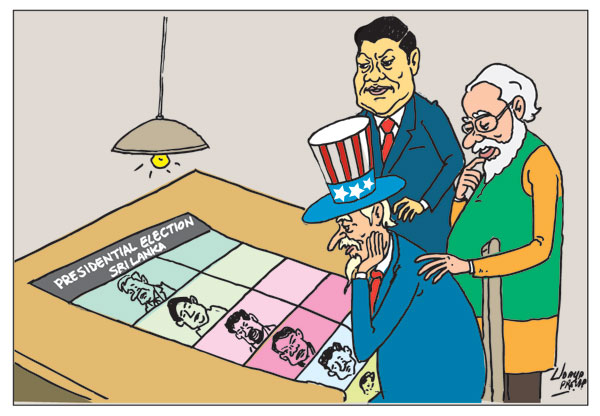
Buying or selling electronics has never been easier with the help of Hitad.lk! We, at Hitad.lk, hear your needs and endeavour to provide you with the perfect listings of electronics; because we have listings for nearly anything! Search for your favourite electronic items for sale on Hitad.lk today!


After Dhammika pulls out, SLPP turns to Namal for presidential race
View(s):